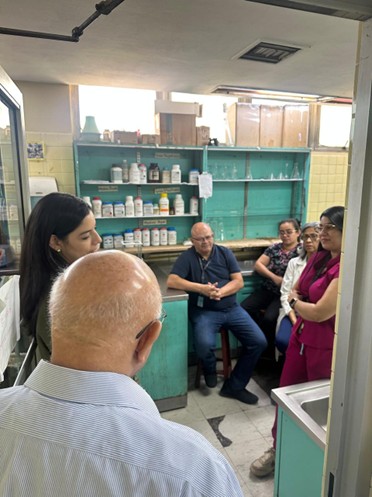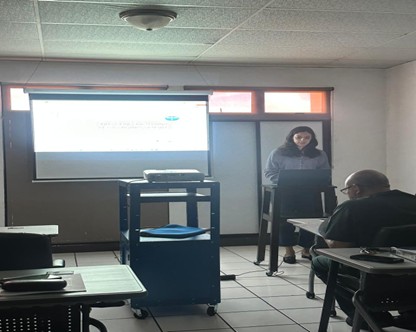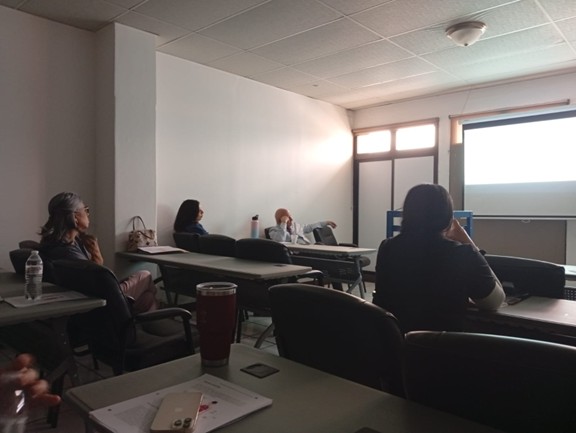Workshop 3: Theoretical–Practical Training on Sample Processing in the Bacteriology Laboratory of Hospital Escuela
Introduction
The Clinical Pathology Center (CPC), a national reference institution committed to excellence in medical care and clinical diagnostics, leads this initiative as part of its mission to provide high-quality diagnostic services, promote research, and foster continuous education. In collaboration with the Infectious Diseases Service, the Department of Internal Medicine, the Clinical Laboratory Department of Hospital Escuela, and the Institute of Infectious Diseases and Parasitology Antonio Vidal, and within the framework of The Global Health Network Latin America and the Caribbean (TGHN LAC) Consortium, a theoretical–practical workshop has been launched to update clinical laboratory personnel in applied clinical microbiology. In Year 2, this joint initiative seeks to enhance the diagnostic capacities of the Bacteriology Laboratory of Hospital Escuela, strengthening the foundations for infectious disease research and supporting clinical decision-making based on microbiological evidence.
General Objective
To review, through a theoretical–practical approach, the procedures for processing clinical samples in the bacteriology laboratory of Hospital Escuela, applying updated criteria for pathogen identification and antimicrobial resistance analysis.
Expected Results
This workshop aims to generate a positive impact on the diagnostic capacity of Hospital Escuela through continuous training of technical personnel, process systematization, and ongoing analysis of microbiological data. It also seeks to encourage teamwork, active participation, and commitment to quality in clinical diagnostics.
📅 Duration: February – October 2025
📍 Modality: In person
🏥 Participating institutions: Clinical Pathology Center (CPC), Hospital Escuela, and Instituto Antonio Vidal
⏰ Session schedule: Fridays, from 11:30 a.m. to 1:00 p.m. (every two weeks)
Workshop Components
🔬 1. Sample Processing Guide
Organized by systems and organs, this component addresses the diagnostic approach for different types of infections: urinary, respiratory, gastrointestinal, skin, nervous system, genital, among others. It includes specific instructions for handling and culturing various types of samples such as blood, sterile fluids, urine, medical devices, and swabs.
📁 2. Clinical Case Presentations
Active participation of laboratory technicians is encouraged through the presentation of real cases, including clinical, microbiological, and therapeutic discussion. Each presentation includes clinical history, laboratory analysis, patient evolution, and diagnostic considerations.
👥 3. Supervision Visits to the Bacteriology Laboratory
With the participation of the CPC team, regular visits are conducted to observe, evaluate, and support the processes carried out in the laboratory, with the aim of identifying improvement opportunities and strengthening good practices.
📝 4. Final Assignment
Participants will prepare an analytical report on the cultures processed over six months (March to August or April to September). The report will analyze frequencies by sample type, culture results, isolated species, and antimicrobial resistance patterns.
Resources
Workshop participants will have access to the following support resources to facilitate learning and documentation of progress:
- 🌐 The Global Health Network platform
- 🌍 The Global Health Network Latin America and the Caribbean
- 🦠 Thematic resource: Antimicrobial Resistance (AMR)
- 📘 Printed educational material with the content of each topic
- 📝 Attendance sheet
- 📜 Certificate of Participation (for those who complete the workshop requirements)
Workshop 3
Session 3 – Technical visit on the processing of vaginal samples in the Bacteriology Laboratory, June 6, 2025.
On June 6, a technical visit to the Bacteriology Laboratory of Hospital Escuela was conducted, aimed at strengthening competencies in the processing of vaginal samples. During the activity, standardized procedures for sample collection, transport, and microbiological analysis were reviewed, with emphasis on detecting agents causing vaginal infections and sexually transmitted infections.
The session included the practical observation of laboratory methods, such as Gram staining and the use of selective culture media.
This technical visit reinforced the importance of the proper handling of vaginal samples as a key tool to support timely diagnosis and contribute to the reproductive health of the population.

Participants during the technical visit in the laboratory area.
Session 3.1 – Processing of genital samples in the Bacteriology Laboratory, June 27, 2025.
This session addressed the microbiological processing of genital samples, highlighting its importance in the timely diagnosis of sexually transmitted infections and other reproductive tract conditions. The main types of samples (urethral, vaginal, and cervical secretions, among others) were reviewed, as well as proper techniques for their collection, transport, and laboratory processing.
The session included a clinical case discussion, which illustrated the application of microbiological criteria in the assessment of patients with suspected genital infection. Practical exercises were also carried out using Gram staining, selective culture media, and rapid tests, reinforcing the importance of proper sample handling to ensure accurate diagnoses and support therapeutic decisions.

Session 3.3 – Processing of Body Fluids in the Bacteriology Laboratory
This session reviewed the processing of normally sterile body fluids, with an emphasis on cerebrospinal fluid (CSF) and its role in diagnosing central nervous system infections. The session covered CSF functions, the importance of the blood–brain barrier, and the main pathogens causing meningitis in different age groups.
The activity included a clinical case discussion, allowing participants to apply the reviewed concepts and highlight the usefulness of microbiological analysis in guiding diagnostic and therapeutic decision-making. Laboratory practices were also conducted, including Gram staining and India ink staining for Cryptococcus spp., emphasizing the need for proper sample handling and transport to ensure reliable results.

Participants during the workshop on body fluids.
Support the community
Thank you for visiting The Global Health Network, please take a moment to read this important message. As you know, our aim is to enable equity in access to research knowledge and this is successfully delivering support and training to 1000’s of research teams all over the world. But we need your support!. If you have benefited from this research skills and knowledge sharing facility, please help us sustain this remarkable and unique provision of information for those who could otherwise not access such support and training. We would be really grateful if you could make a donation or ask your employer or organisation to contribute to the costs of maintaining this platform and the generation of new contents for all users. Just a small contribution from everyone who can afford to pay would keep this available for those who cannot. Thank you, we really appreciate your part in this community effort to better equity in global health research.
